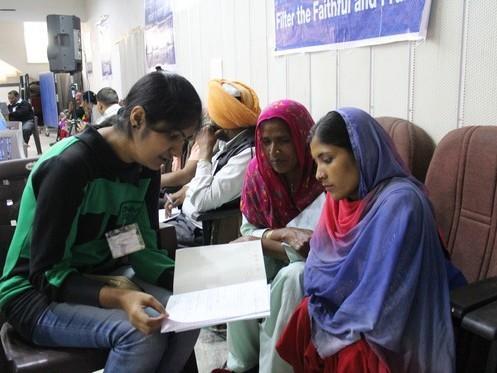The Church Meeting
When you become a Christian, you are a member of God’s family. Every spiritual child needs to become a part of a spiritual family. God is your heavenly father, and all Christians are like brothers and sisters of the same family. “This household is the church of the living God…” (1 Timothy 3:15). The household is not a building, and the “church” is not a place of worship, but a group of believers.
Please download the PDF and use the Bible to look up the answers to all the questions below.
A. How does the Bible describe the relationship between Jesus and Christians?
- Romans 12:5
- Ephesians 1:22- 23
B. What is Christ’s position in the church?
- Ephesians 5:23
C. The Functions of the Church
- Worship: to worship God. “Praise God, sing to the Lord a new song, his praise in the assembly of the saints.” (Psalms 149:1)
- Fellowship: to share. “And let us consider how we can spur one another on toward love and good deeds.” (Hebrews 10:24)
- Teaching: to learn to obey. “…and teaching them to obey everything I have commanded you.” (Matthew 28:20)
- Ministry: to serve. “…to prepare God’s people for works of service so that the body of Christ may be built up.” (Ephesians 4:12)
- The Power of the Holy Spirit: to spread the gospel. “But you will receive power when the Holy Spirit has come upon you…” (Acts 1:8)
Can Christians today not attend church?
Yes/ No/ It Depends
Do you have difficulty attending church?
Yes/ No/ It Depends
D. Why should you attend church
- Because we need worship, fellowship, teaching, ministry and the Holy Spirit’s power.
- Because this is God’s command. “And let us not ___________ our meeting together, as some people do, but ___________ and ___________ each other, especially now that the day of his_____________ again is drawing near.” (Hebrews 10:25)
- To avoid deviating from the truth of the Bible.
- Because there are mature Christians in church to help you.
E. Three Obligations We Have in Church
1. Our obligation to be united with Christ – Baptism (Rom 6:1-14)
a. Baptism is a fulfilment of our faith.
-
Jesus said that baptism was to “fulfil all righteousness.” Matthew 3:15
-
Jesus set an example for us. He was baptized even though He never sinned, but because He knew it was the right thing to do.
b. Baptism is a proclamation of our faith.
-
The words and actions of baptism communicate to those present that we are positioned in Christ Jesus. Romans 6:3
c. Baptism is a confirmation of our faith.
-
We know and feel that we are freed from the old dead person, and live a new life of resurrection power. Romans 6:6-14
d. Baptism is a witness of our faith.
-
Baptism is to show that we are dead, buried and resurrected together with the Lord.
We were therefore __________ with him through baptism into __________ in order that, just as Christ was __________ from the dead through the __________ of the Father, we too may live a _______ life.” Romans 6:4
e. Baptism is a symbol of our faith.
-
Baptism does not have the power to forgive sins. We are saved when we confess with our mouth and believe in our heart. Romans 10:9
2. Our Obligation to Remember - The Lord’s Supper
- Jesus personally set the Lord’s Supper as a remembrance of His death and shedding of blood for our sins. Matthew 26:17-19, 26-30
-
When we take the Lord’s Supper, it helps us to remember and to give thanks.
“The ___________ that brought us _________ was upon him, and by ____________ we are _________.” Isaiah 53:5
- When we receive the Lord’s Supper, we have time to examine our actions and faith.1 Corinthians 11:23-29
3. Our obligation to give – Offerings
Offerings are thank-you gifts given to God as acts of worship. Offerings can include sacrifices of a person’s life, goals, time, abilities, and finances. Monetary offerings are required by God and are a test of the disciple’s faith, love, and obedience. Three kinds of monetary offerings are mentioned in the Bible.
-
Tithes. God commands us to tithe; the tithe belongs to God. It is not a voluntary offering, but what we are required to give. (Leviticus 27:30–31). The tithe should be paid; you can decide what to do with the other 90%, but we should give 10% back to God because it already belongs to Him.
“ Will a mere _________ rob God? Yet you rob me. But you ask, ‘How are we robbing you?’ In_________ and _________. You are under a curse, your whole _________, because you are robbing me. Bring the whole _________ into the storehouse, that there may be food in my house. _________ me in this,” says the Lord Almighty, “and see if I will not throw open the floodgates of _________ and pour out so much _________ that there will not be room enough to _________ it.” Mal. 3:8-10
-
Gifts and Offerings. This is a truly voluntary offering arising from a thankful and sincere heart. The amount of the gift is your own personal decision. We cannot worship God without gifts and offerings. We should not continually come empty-handed into God’s presence.
-
Love Offerings. This is offering given to others. It is motivated by love and is given according to what a person has and according to the needs of others. Gift and love offerings cannot replace the tithe.
This week, make a commitment to becoming a church together. Begin adding these three obligations into your meeting times.
